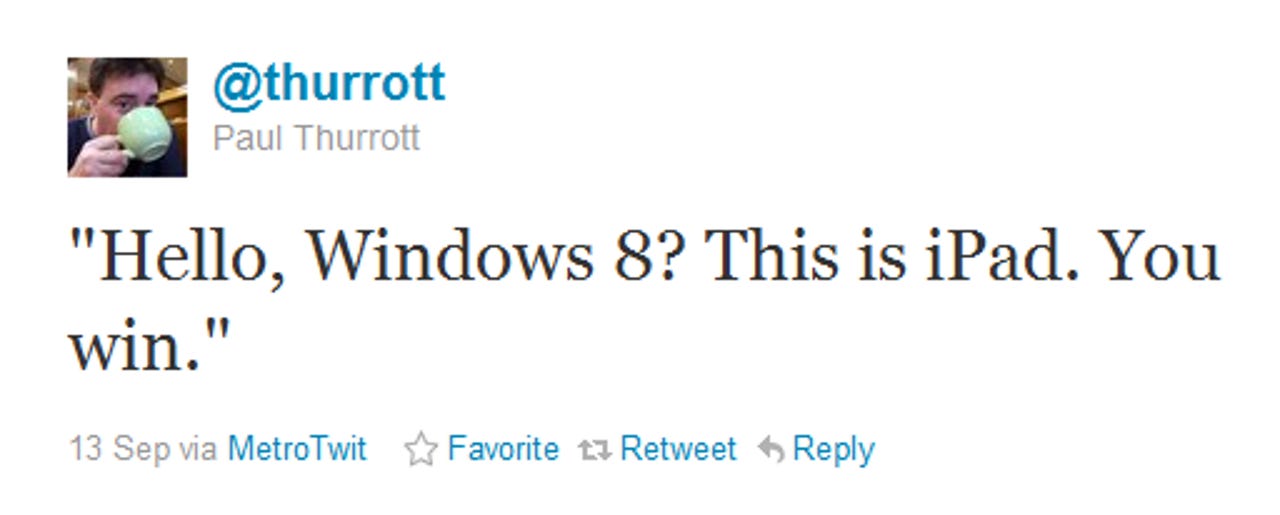It's too early to declare Windows 8 an iPad killer

Yesterday a few Windows pundits got overexcited at the sight of Windows 8 at the BUILD conference and started declaring Windows 8 an iPad killer.
Woah there ... REWIND!
It's way too early to declare Windows 8 an anything killer, let alone an iPad killer.
Here's an example of a pundits getting all prematurely, this is a tweet by Paul Thurrott:
I think Thurrott's got the stepladder out to hang up 'Mission Accomplished' banner already. Slow down! There's a lot of stuff that has to happen if Windows 8 is going to become a serious tablet OS, let alone make have any impact on the iPad.
#1 - Microsoft needs to make a compelling case for Windows 8 tablets
I know that it's easy to think that traditional computing (that is, 'doing it on a desktop or notebook') is dead, but it isn't. Not by a long shot.
One thing that Microsoft needs to start talking about is why we need the full Windows OS on a tablet. I know it's Windows, and I know that's a big deal for Microsoft, but what advantages does a full-blown OS on a tablet have over Android and iOS? What will having Windows offer over the competition?
Note: There are a number of very good reasons for why Microsoft wants to shoehorn Windows onto tablets - two that spring to mind instantly is 1) Microsoft makes a LOT of money from Windows, and; 2) There's no app ecosystem that has to flourish in advance of a release. However, these are two benefits for Microsoft, not the user.
So, Microsoft, why is Windows on a tablet the OS of choice?
#2 - OEMs have to play their part
If a Windows 8 tablet is to become successful then the big-name OEMs are going to have to do their bit. They're going to have to build good quality hardware and sell it at a reasonable price. OEMs are wary of putting a lot of time and money into speculative markets - take a look at how cautiously they're entering the ultrabook market. There's a lot of risk in new markets and devices (just ask HP about the TouchPad) and no one wants to invest in something that might flop.
And OEMs trying to sell Windows tablets are going to have a harder time that Apple as selling the iPad. What differentiates the product from one OEM compared to another? Usually it's just price, which means that Microsoft will see it's OEMs fighting one another, and that will kick off a race to the bottom in terms of price.
#3 - Windows 8 is still a ways off
There's many a slip 'twixt the cup and the lip.
Probably the earliest we'll see Windows 8 hit PC s is April 2012. That's a LONG way off in tech terms. It's at least one iPad iteration away, which means that there's no point looking at Windows 8, or even reference specs for tablets, and comparing them to the iPad 2. Any Windows 8 tablet is going to be going up against the iPad 3 ... and we don't know anything about the iPad 3.
#4 - Legacy support
One of the advantages of having Windows on a tablet is the fact that it'll have support for all your desktop/notebook software and hardware, right?
Well, maybe ... see the issue here is that Microsoft has been talking a lot about an ARM version of Windows for tablets, and this version won't offer legacy support.
Microsoft so far is being coy about the ARM version of Windows. The tablets that were given out to developers at the BUILD conference was an x86 machine running Intel Core i5 silicon. Also, there's no ARM version of Windows for download.
If tablets are going to be powered primarily by ARM processors, then there will be no legacy support ... so that kinda kills off one of the primary reasons for having a Windows-based tablet.
#5 - Will Windows 8 tablets have any effect on the iPad (or vice versa)?
Why does Windows 8 tablets have to compete with the iPad (let alone become a 'killer')?
The way I see it, the iPad stands alone. Apple doesn't even call it a tablet. Sure, it is a tablet but I think that when people are buying an iPad they're not thinking 'oh, I'm buying a tablet,' they're thinking 'oh, I'm buying an iPad!' Big difference.
Will a Windows 8 tablet affect the iPad? I don't think it will. The iPad is to well established and appeals to a different audience.
[UPDATE: Dwight Silverman has a good post over on TechBlog listing the Four things that will make - or break - Windows 8. He offers up four additional points that I think are equally valid. Check it out.]
